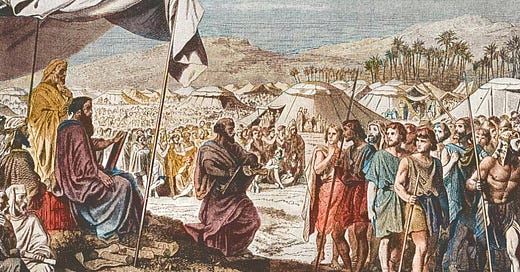Leadership in Numbers
Welcome to Venturing Into the Parsha, a weekly(ish) e-mail intended to provide insights from the Jewish holidays and weekly Torah portions that impact and uplift our roles as investors, founders, and operators. These are intended to be ~5 paragraphs and intentionally brief. Questions or comments are always welcome in response.
This week’s VITP is dedicated as a prayer for the speedy and safe return of our 100+ hostages being held in Gaza and the thousands of soldiers spending Shabbat and Passover keeping the land of Israel safe.
In English, the fourth book of the Torah is referred to as Numbers, a curious deviation from the Hebrew bamidbar which literally translates to “in the desert.” The reason for this deviation is that counting is at the core of the entire book, and, in fact, our parsha opens with a new census of the Jewish people. At the most basic levels, the census was performed ahead of the Jews heading into war in order to better prepare battle strategies and organization. But the Jewish sages prod us to push much deeper.
I learned from my Rabbi, Rabbi Beryl Gershenfeld the following explanations of Rabbi Moshe ben Nachman, better known as the Ramban:
A census is more than a geographical accounting. It is a reflection that each individual is fundamentally necessary to the broader group and inherently important. A simple individual might mistakenly believe that they are defined by their tribe or leaders. This is incorrect. Each individual is a requisite part of the whole. The greatest feeling a human being can receive is someone they admire telling them they are important.
The Jewish people had traveled down to Egypt 210 years prior as a nation of 70 persons. They departed 210 years later more than 600,000 strong. Counting — with the right intention — is inherently an act of gratitude. People count their money (or, perhaps, their wine bottles in their cellar!!) because they are grateful for what they have. The census in the desert was a reminder that there was so much to be grateful for.
The census in the desert was actually performed directly by Moses and Aaron. Each member of the nation received several seconds of face time in front of these two great leaders. This was intentional. The Torah understands that the opportunity to be in the presence of extraordinary people provides aspiration to become greater ourselves.
Personally I believe each of these lessons are relevant and crucial to our roles in startups and investing. Each worker in an organization — especially in an organism as delicate as a startup where early employees are often underpaid and overworked — needs to feel vital, loved, and important. In addition, they need to receive sufficient facetime from leaders in their org they look up to in order to remain loyal to the mission. Most importantly, everyone needs to look around at their teams grateful for the opportunity to work with exceptional people. I will admit that for several years during ZIRP, “team size” became a mechanism for hubris rather than gratitude; thankfully that has been largely corrected over the past 18 months.
Wishing everyone a shabbat shalom.



